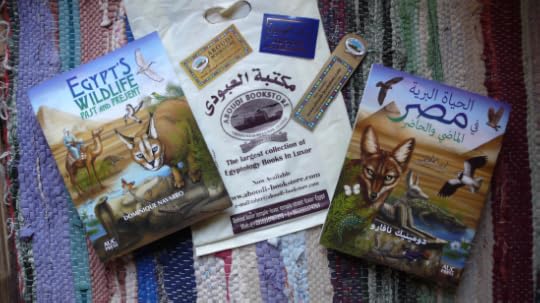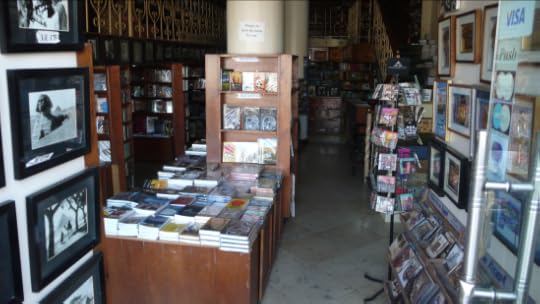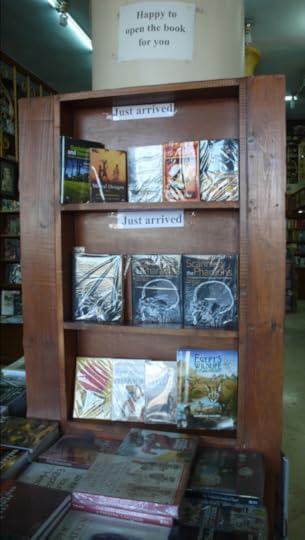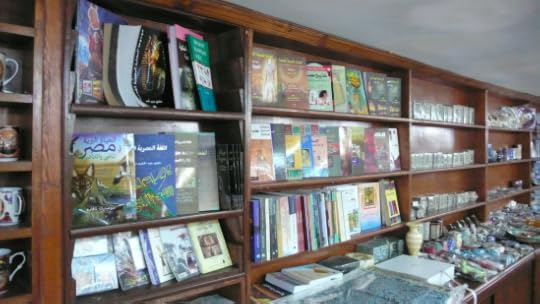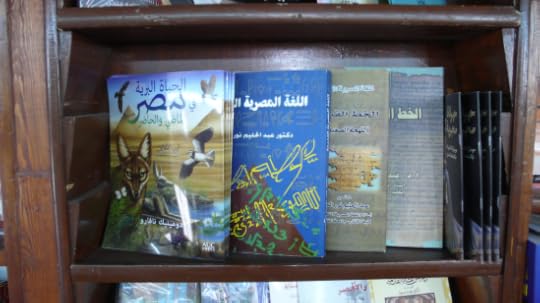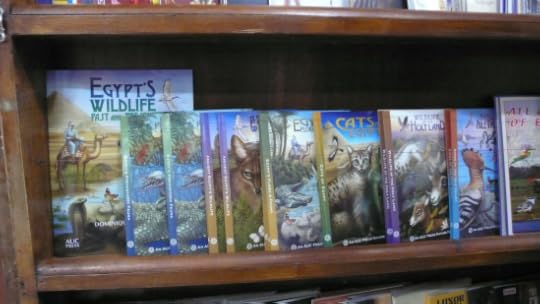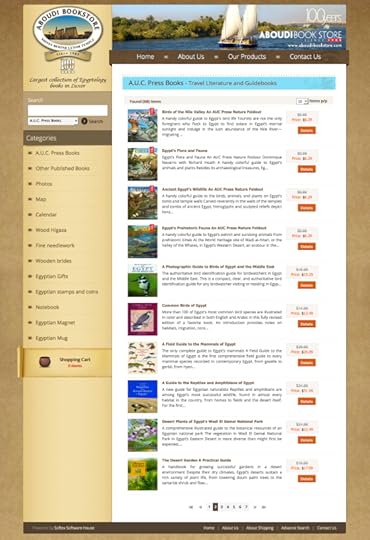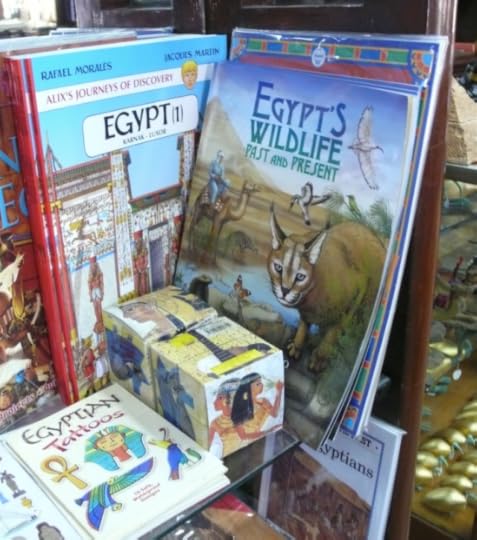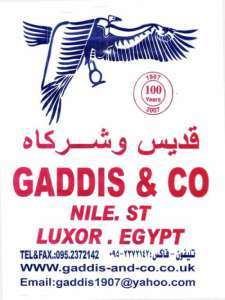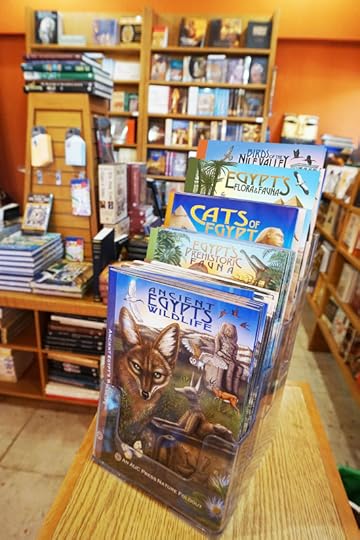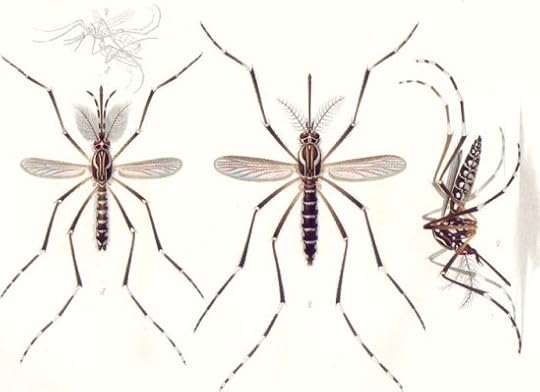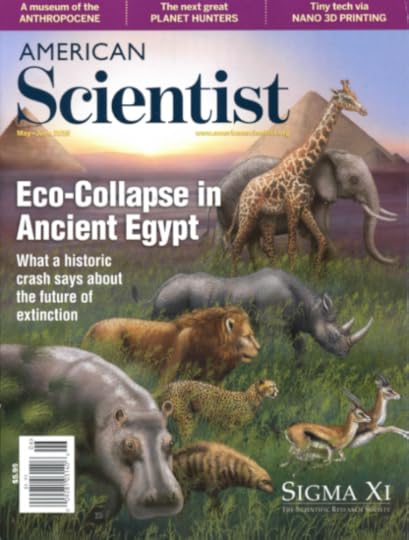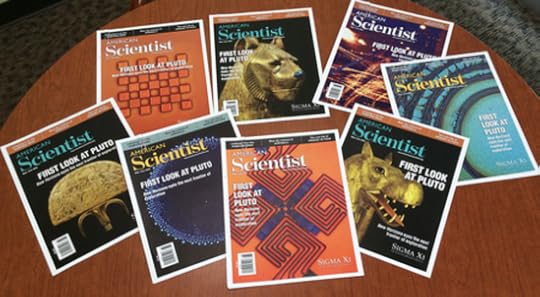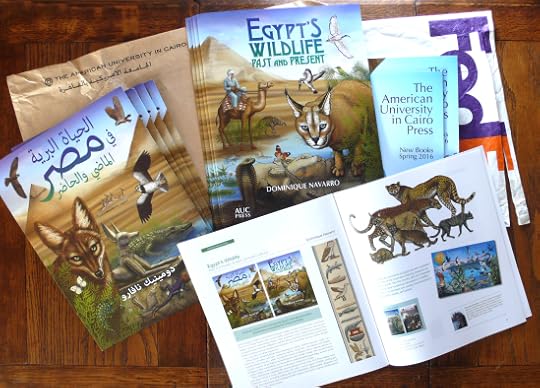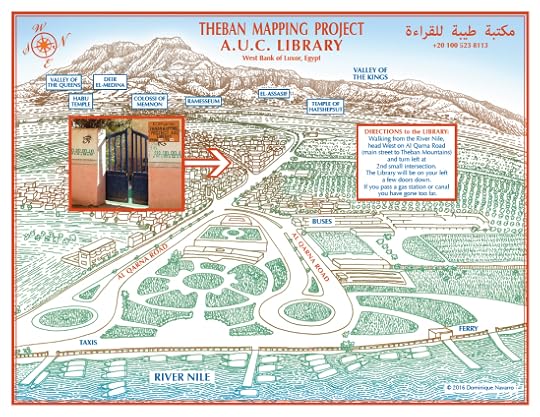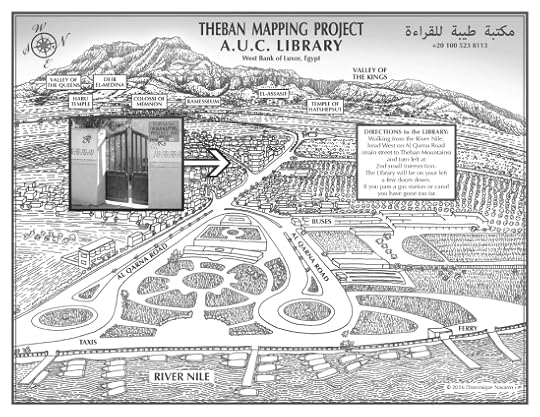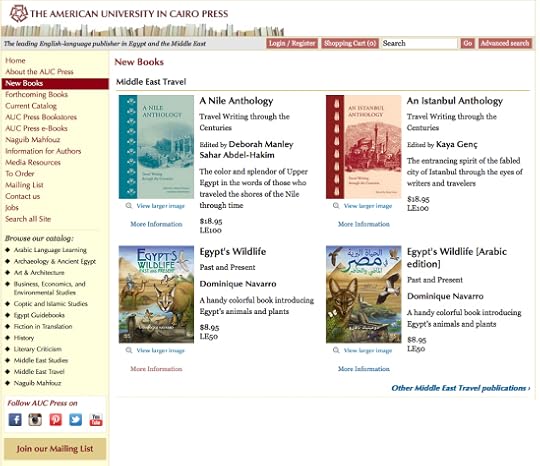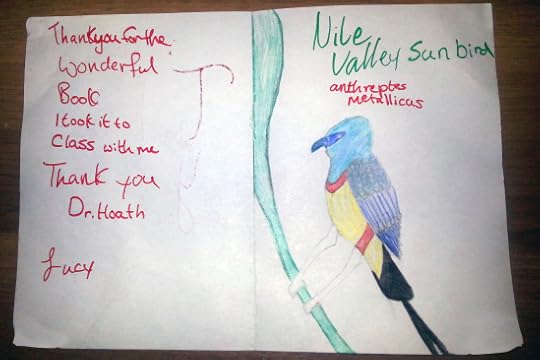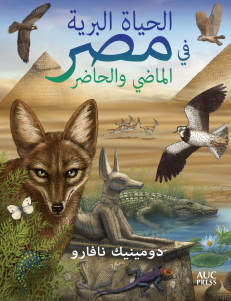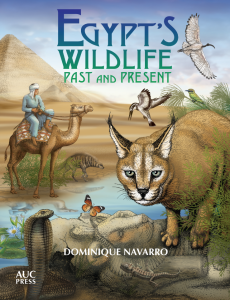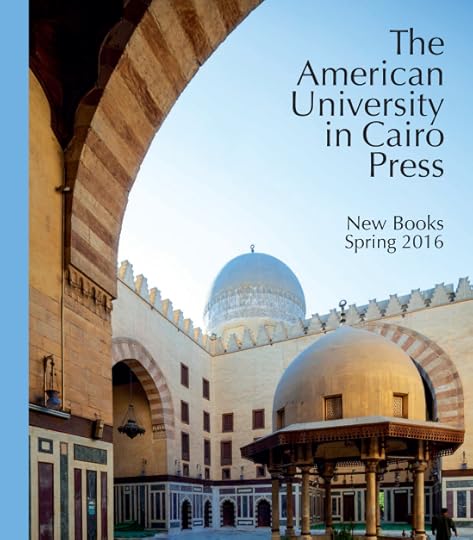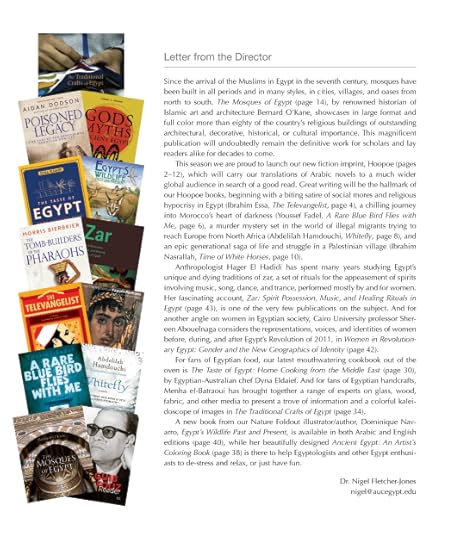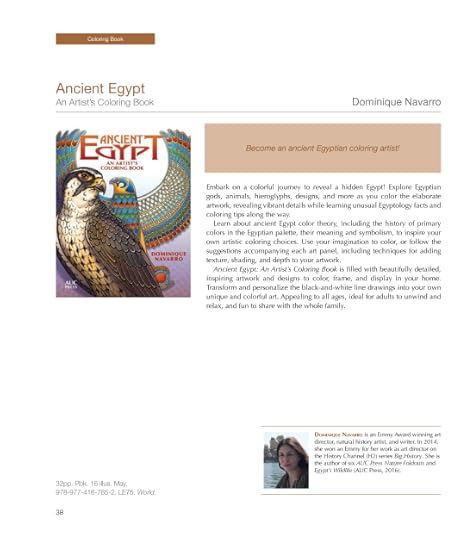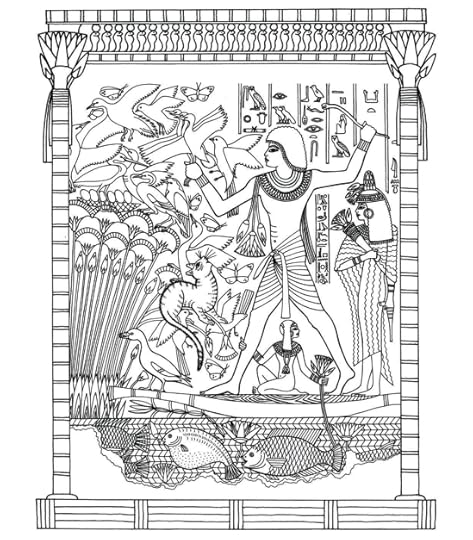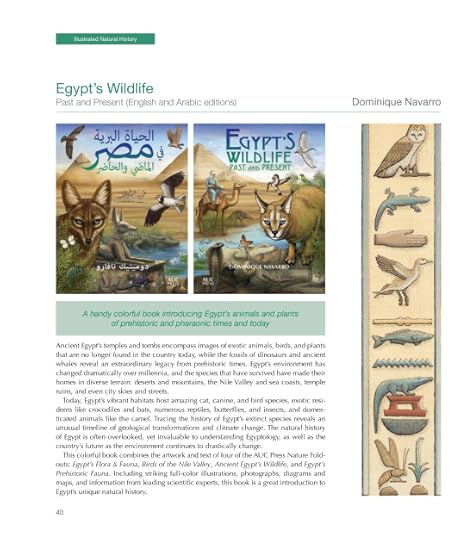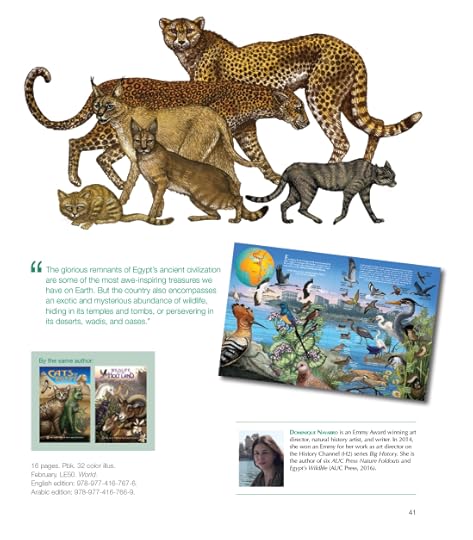Dominique Navarro's Blog, page 8
April 1, 2016
New Books at Aboudi Bookstore in Luxor!
The new books, Egypt’s Wildlife, Past and Present, are now available at Aboudi Bookstore, across from Luxor Temple. It has a wonderful selection of books including many publications by AUC Press. Drop by their store on El Karnak Street!
I bought this set as a gift to the Chicago House library!
All 6 AUC Press Nature Foldouts are also available:
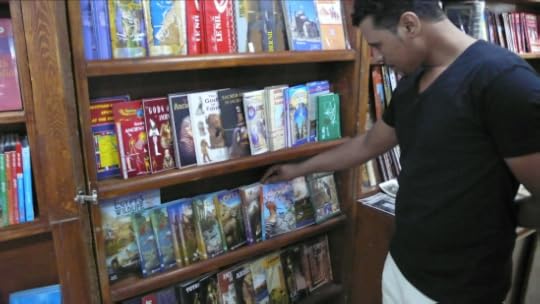
Aboudi Bookstore also has a website providing a list of their fantastic selection of books, artwork, photos, and a variety of gifts, ordering and shipping options, and a lovely history of their store celebrating over a 100 years of service! http://www.aboudi-bookstore.com
You will also find the AUC Press Nature Foldouts available on their website: http://www.aboudi-bookstore.com/onlinestore/search.php?category=466&subcategory=556
Filed under: AUC Press Nature Foldout News Updates








New Book and Foldouts Available at Gaddis & Co. Bookstore in Luxor!
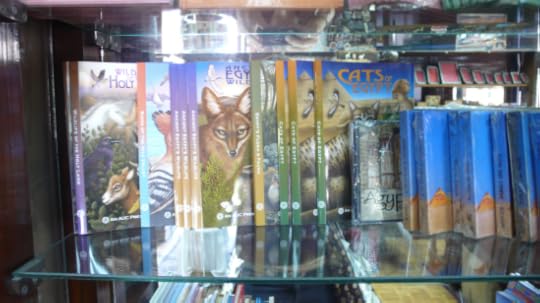
The newest book Egypt’s Wildlife, Past and Present and AUC Press Nature Foldouts are available at Gaddis & Co. Gift and Bookstore, in front of the legendary Winter Palace.
Open since 1907, it has a wonderful selection of books including many publications by AUC Press.
Photos of the store from 1907 and again in 2007!
Drop by their store on Corniche Al Nil!
Filed under: AUC Press Nature Foldout News Updates








March 17, 2016
AUC Press Nature Foldouts at the AUC University Bookstore in Egypt!
All the things you need @ the #AUC#University#Bookstore!
Location: New Cairo Campus, Bartlett Plaza, Campus Center
Hours: 9:00 am – 4:00 pm daily; closed Friday & Saturday
Phone: (20-2) 2615 1305
Filed under: AUC Press Nature Foldout News Updates








March 11, 2016
ناموسة Namoos! Mosquito!
Aedes aegypti by Emil August Goeldi (1859 – 1917). – E. A. Goeldi (1905)
I know “shwaya” Arabic, but one of my most frequently used Arabic words when living in Egypt is ناموسة or namoos! The mosquitoes are large, aggressive, and cause serious insomnia (from itching and paranoia). Egypt has successfully eradicated problems of malaria in the country (http://www.cdc.gov/malaria/new_info/2014/malariaegypt.htm), but their aggravation remains.
I’ve often found myself wondering about their purpose here on Earth. In the epic battle with mosquitoes, it’s easy to ponder the question “why are they here?” Are they really a “necessary evil?”
Blamed for spreading malaria that kills a half-million people each year and now the villain behind the Zika virus that has sparked panic across South and Central America, many scientists are being asked the same question. Malaria is a top priority of the Bill & Melinda Gates Foundation: http://www.gatesfoundation.org/What-We-Do/Global-Health/Malaria
But the answer is that mosquitoes do serve a greater purpose in the ecosystem: Here’s Why It’s a Very Bad Idea to Wipe Mosquitoes Off the Face of the Earth By Michael Casey
“…eliminating mosquitoes would deprive many fish, birds, and reptiles of a food source and even deny some plants a critical pollinator.
“These are not an organism that you should eliminate without repercussion of eliminating a major prey base for aquatic habitats – ponds, marshes, tree holes… there are some fish that feed exclusively on mosquito larvae, spiders that catch adults in their webs, and bats that gobble up swarms of mosquitoes at night…exterminating all mosquitoes could have severe ecological consequences, as mosquitoes make up a substantial biomass in ecosystems globally.”
“A small minority of the species play a serious role in transmitting the pathogens that cause diseases in humans, so it makes perfect sense from a public health standpoint to devise ways to keep those mosquitoes from biting people,” said Dan Strickman, a senior program officer at the Bill & Melinda Gates Foundation. “We believe that we can be smart about mosquito control by targeting those locations where the disease problems occur and by using surveillance to tell us where we need to do a better job. Efficient mosquito control to reduce the way that malaria gets from person to person combined with curing people who carry the malaria parasites will create a malaria-free world without consigning any species to history.”
Filed under: Related Stories








March 2, 2016
The Voodoo Science of Choosing a Successful Cover
The Voodoo Science of Choosing a Successful Cover by Barbara Aulicino
Inspiration for a cover doesn’t always come right away, and at first nothing was quickening the pulse for the May–June issue of American Scientist. Although the topics themselves were compelling, consider the imagery conjured up by our feature article lineup: Taste aversion and sickness? Yuck! Fatigue in the workplace? Yawn. The next great exoplanet hunt? Not an option. (Our January–February cover had featured images of Pluto and Charon, so it was too soon to run another space cover.) Nanoscale fabrication? Just finding an opening image for that article had been tough. A cover? Fuhgeddaboutit! 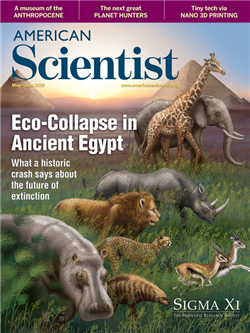
Sitting in lotus position and meditating on my Vishudda chakra (you know, the one that governs creative expression—nice light blue color?) wasn’t helping. Divine inspiration finally came in the form of interim editor Corey Powell (@coreyspowell) and editor-in-chief Jamie Vernon (@jlvernonphd) suggesting a focus on Justin Yeakel and Jennifer Dunne’s article about ancient food webs and steering me toward artist Dominique Navarro.
Dominique and I decided to try repurposing some of her Egyptian flora and fauna illustrations from American University in Cairo Press’s Nature Foldout series. She sent mockups and we tweaked. After six rounds of refinements, we settled on an Egyptian landscape with a shortened depth of field to create a perception of compressed space and time. Representing the shift from a humid to an arid climate, the image depicts larger-bodied mammals from the African Humid Period—some of them destined for extinction because of the climatic changes—as they push through flank-high grasses, moving left to right across the landscape.
Of course it’s always good to have a backup plan in case Plan A doesn’t pan out. Here’s a look at some of the options we had on hand for Plan B.
Fortunately, Plan A, with Dominique’s excellent illustrations, made for a distinctive cover that we hope will help the issue sell out on the newsstand. This month American Scientist should be particularly easy to find, as it’s being specially featured in selected Barnes & Noble stores. Our May–June issue goes on sale tomorrow—look for it in the science section of a newsstand near you.
This post is published in From the Staff
Buy back issues of this magazine on Amazon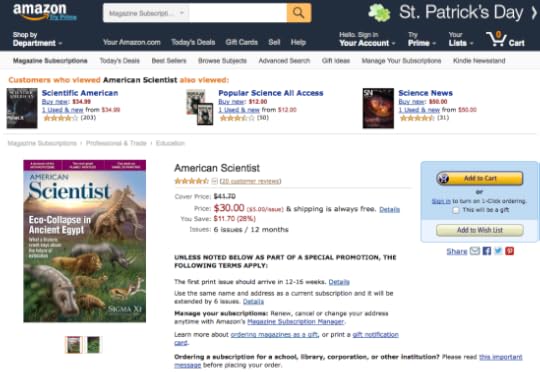
Filed under: Related Stories








March 1, 2016
New Books Just Arrived: “Egypt’s Wildlife, Past & Present” in English and Arabic!
Always a joy when the FedEx truck drives up to deliver your finished books direct from Cairo, Egypt!
Today’s package included:
“Egypt’s Wildlife, Past and Present” in English
“Egypt’s Wildlife, Past and Present” in Arabic
and the AUC Press Spring 2016 New Books Catalog!
Get yours:
Filed under: AUC Press Nature Foldout News Updates








Map for the Theban Mapping Project Library, Luxor, Egypt
The Theban Mapping Project A.U.C. Library needed a map, so I made one! Click to get the pdf versions and print yours, then come to the library in Luxor, Egypt, for a visit!
Or visit on Facebook: https://www.facebook.com/tmplibrary/
Or their website: http://www.tmp-library.org/
Filed under: AUC Press Nature Foldout News Updates, Related Stories 







February 26, 2016
New Books from AUC Press! including “Egypt’s Wildlife, Past & Present” in English AND Arabic!
New books from AUC Press! including “Egypt’s Wildlife, Past & Present” by Dominique Navarro, in English AND Arabic!
Purchase from AUC Press: http://aucpress.com/t-newpublications.aspx
Or pre-order from Amazon (English only): http://www.amazon.com/Egypts-Wildlife-Present-Dominique-Navarro/dp/9774167678/ref=sr_1_15?ie=UTF8&qid=1456534875&sr=8-15&keywords=dominique+navarro
Filed under: AUC Press Nature Foldout News Updates








February 10, 2016
Thank You Dr. Hoath! Drawing by Lucy
Richard Hoath gave a young naturalist named Lucy the new “Egypt’s Wildlife Past and Present” book, and she gave him this fantastic thank you note in return!
Filed under: AUC Press Nature Foldout News Updates









